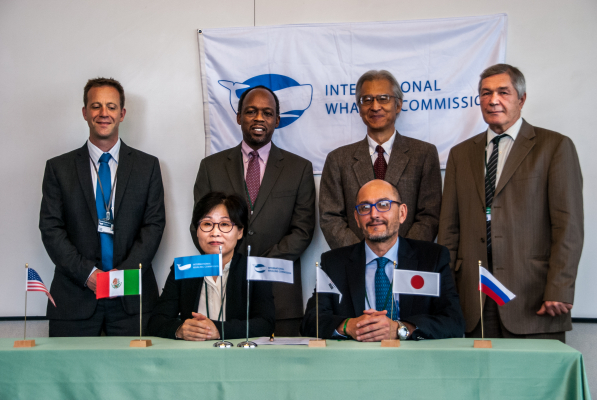A wide variety of topics on day two of the IWC Plenary
The second day of the IWC Plenary began with a vote. Consensus was not reached on a proposal for the establishment of a whale sanctuary in the South Atlantic and therefore a vote was required. As a potential amendment to the IWC Schedule (the document which sets out specific IWC regulations) this vote required a three quarters majority in order to succeed. 64 governments were present with 38 voting yes, 24 voting no, and 2 abstentions. The three quarters majority was not met and the proposal was not passed.
Initial discussions also took place on five Resolutions. These are on:
- Food Security (submitted by Cote d’Ivoire, Ghana and Republic of Guinea).
- Creation of a Fund to Strengthen the Capacity of Governments of Limited Means to Participate in the Work of the IWC (submitted by Cambodia, Ghana and Japan);
- Cetaceans and Ecosystem Services (submitted by Chile);
- the Minamata Convention (submitted by Brazil, Colombia and Uruguay).
- the Critically Endangered Vaquita (submitted by the USA);
As with the two Resolutions introduced on Monday, the discussions on each of these proposals will continue in the margins, with proponents and the Chair deciding when to bring each one back to the Plenary for further discussion.
Aboriginal Subsistence Whaling (ASW) was also on today's agenda. A Resolution passed at the 2014 IWC Meeting sought a more consistent and long term approach to considering ASW at the Commission, and a report was received on progress. The Plenary also heard a presentation on the Rights of Indigenous People by Dr Dalee Dorough, a Expert Member of the United Nations Permanent Forum on Indigenous Issues, and discussed what further work would be undertaken over the next intersessional period and before ASW whaling quotas are re-considered at the 2018 Commission meeting.
Away from the plenary, a 2014 Memorandum of Cooperation extended its impact with two more member governments becoming signatories. The Governments of Mexico and the Republic of Korea joined Japan, the Russian Federation and the USA who established the Memorandum in conjunction with the IWC and the International Union for the Conservation of Nature (IUCN). The Memorandum reinforces the importance of collaboration between the range states of the critically endangered western North Pacific gray whale.

